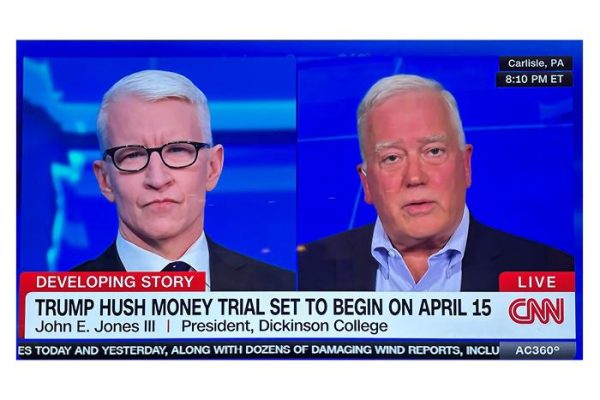David Oyelowo Addresses Race, Representation in Cinema
Actor, producer and director David Oyelowo visited Dickinson’s campus during the annual Poitras Gleim lecture Monday, March 6 and focused on his personal experience with immigration during the lecture.
The event was organized by the Student Senate Academics Committee, which oversees the Poitras Gleim Lecture, a gift endowed by Edward Poitras and Kay Gleim Poitras ’53 “to challenge the imagination of Dickinson students and faculty in discovering interesting individuals who cross traditional professional and disciplinary boundaries,” according to the Dickinson College website. With a full house in the Anita Tuvin Schlecter Auditorium (ATS), Susan Rose, professor of sociology and director of the community studies center served as the moderator.
Born in Oxford, England, Oyelowo spent the first six years of his live in England before moving to Nigeria where his family spent the next seven years, before returning to the United Kingdom. It was not until later in life that Oyelowo and his wife, Jessica, crossed the Atlantic to live in the United States, of which Oyelowo became a citizen merely six months ago.
Oyelowo believes that his constant migration throughout life has helped him with his acting career; Oyelowo explained that he can, and has, played Americans, Africans and Europeans well. He attributes his ability to his international upbringing.
Throughout his life, Oyelowo has developed a focus on perspective. Oyelowo explained that through his upbringing in Nigeria he was given the greatest gift from the ages of six to 13 years old; he had the ability to live in a society where he was not the minority. By being a part of the majority in his community, every opportunity available was Oyelowo’s for the taking.
Oyelowo attributes his success to what he calls the ‘Sydney Poitier effect.’ Poiter was a Bahamian actor who was the first African-American to win an Academy Award for Best Actor. Poiter’s childhood in a community in which he was the minority created a strong foundation for his future and career in America. Similarly, Oyelowo’s childhood led him to being less fazed by discrimination.
Oyelowo continued to delve deeper into perspective, describing it as a reflection of the values those in charge hold. In Hollywood, Oyelowo explained, writers write their story. He used The Help as an example of how perspective can be used to focus a story, in this case, around Emma Stone’s character, Skeeter. He also mentioned a focus on Lindon B. Johnson for Selma which was quickly changed to highlight Dr. King.
“The point I’m trying to make,” stated Oyelowo, “is that we need balance.”
Historically, Hollywood has depicted African-Americans as drug dealers and criminals as opposed to a civil rights leader, such as Dr. King, or a prince. Oyelowo commented that he specifically seeks roles that are typically cast white. Oyelowo said that he makes an effort to be active in his choices, and he wants the students at Dickinson to be intentional about what we want to see in the world. If there is no action, he said, there is no change. Oyelowo actively sought a female director and writer because he hopes to support and see more female writers, he actively went after a female director to play a part in her writing.
Oyelowo also described his experience in The Butler, in which he played Oprah Winfrey’s son.
Funding for the film fell short 20% compared to other films, which Oyelowo attributes to the fact that the plot was based on African-American protagonists.
Similarly, Oyelowo explained the struggles of getting funding for Selma. Oyelowo called Oprah Winfrey personally to get her on board and gain the studio’s confidence in the film in order to make the movie production possible. Oyelowo joked that the US has a national holiday dedicated to Dr. Martin Luther King Jr. and “you’d think the studio would want to make a movie after that, but nope, it took Oprah.” The crowd laughed, as he consistently slid witty jokes into his deep conversation on race, immigration and gender.
Oyelowo challenged the audience to think deeply of actions they take, stressing that diversity and inclusion make for a healthy society. “The thing that is going to break [prejudice] down is, literally, breaking down ignorance,” he said.
With sadness, Oyelowo concluded the lecture with the declaration that the foundation upon which the US was built is being denied because of the threat Americans feel to their status in the world. He reminded the audience that building walls and shutting other out never works and simply speeds destruction.
After the talk, student attendee Megan Magruder ’17 said, “I thought that the talk was meaningful because Mr. Oyelowo brought up many painful historical truths that are especially crucial to bring to public discourse within academia and beyond, with rising nationalism promulgating and maintaining bigotry and injustice.”
Another student Olivia Lyman ’19 said, “One thing that he spoke of that will forever stick with me is that if you are not part of the solution, you just might be a part of the problem.”
Even Interim President Neil Weissman found the talk to be captivating as he said, “I thought it was an engaging and provocative talk and one that people need to reflect on the kind of talk that Ted Poitras and Kay Gleim have in mind for the lectureship.”



